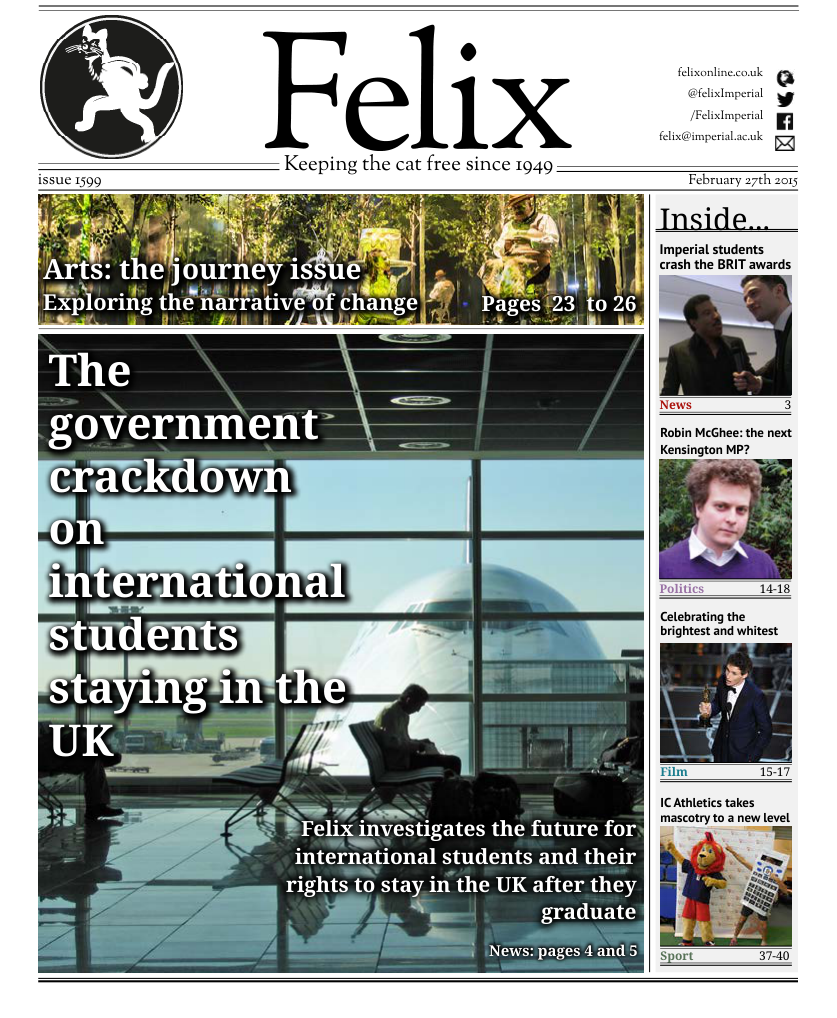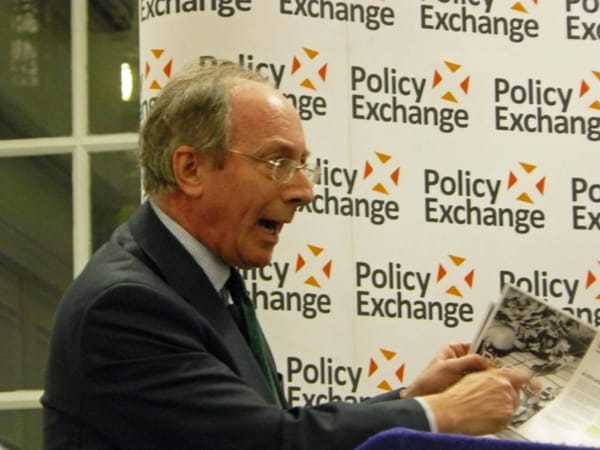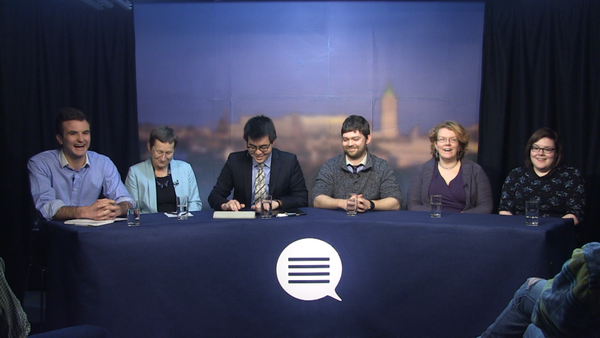What’s going on with student visas?
With anger and uncertainty over the Government’s immigration policy, Philip Kent finds out what’s going on
An influential group of MPs has criticised the Government’s student visa policy this week. In a report published by the All-Party Parliamentary Group on Migration, the MPs argued for re-opening of the “post-study work route” following graduation.
Up until 2012, international students could remain in the UK for up to two years while searching for another educational course (for example, a Masters) or employment. Following the change, students have only four months, meaning an Imperial undergraduate whose course ends in late June may remain in the UK until late October.
The group of MPs argued for this period to be extended to twelve months, in order to “[maximise] the attractiveness of UK higher education in the face of an increasingly competitive international marketplace”.
A decrease in the number of international students was felt to be due to this change in how student visas work, dropping by near 5,000 between the years 11-12 and 12-13, although the numbers are now again on the increase. There are currently in the region of 300,000 students from outside the EU in UK universities.
Former vice-chancellor at the University of East Anglia, Prof. Edward Acton, said that the Home Office’s policies have “butchered” relationships with India. Statistics from the Higher Education Statistics Agency found a 25% reduction in the number of Indian students during the year 2012-13.
Imperial College Union’s International Officer, Katherine Chio, supported the proposal by the parliamentary group, telling Felix, “By extending the visa expiry date from four months after graduation to one year, this could attract the most qualified international students to further study and work in the UK after graduation, hence contributing to the UK’s job market and economy.”
The current government has a policy to reduce the number of net migrants into the UK below 100,000, thus motivating changes to the visa system. A motion was raised in the House of Commons by Labour MP Paul Blomfield, with backing by Conservative MP Mark Field, and Lib Dem MP Sir Andrew Stunell, calling for students to be exempted from such a cap.
Mr. Blomfield said, “Five parliamentary select committees have urged the government to stop attacking students in its immigration policy and handing the advantage to our international competitors”.
This motion was backed by Universities UK, the umbrella group for UK higher education organisations, and the Institute of Directors. The University of Sheffield has also publicly supported the early day motion on its website. This motion is yet to be voted on by the House of Commons.
Meanwhile, a group of business leaders including Baroness Lane-Fox (CEO of Lastminute.com) and Simon Collins (UK Chairman of professional services firm KPMG) have written a letter to the Financial Times, similarly calling on students to be removed from immigration quotas.
In this letter, the businessmen and women say, “We do not want to lose these talented people to our competitor economies as a result of ill-thought-out immigration policies.” The letter also notes a poll by ICM for Universities UK and think-tank British Future, which found that 75% of respondents think that international students should be able to stay and work in the UK following the completion of their studies.
Meanwhile, near 60% of respondents think that international student numbers should not be cut, and around 80% think that international students do not count as immigrants at all.
The rhetoric against foreign students has worsened over the past few years. In 2013, the Government announced proposals to charge non- EU migrants a ‘surcharge’ upon entry to access the NHS, including students. The charge, to be £150 for students, will be brought into effect later this year.
"We do not want to lose these talented people to our competitor economies as a result of ill- thought-out immigration policies."
Meanwhile, last year Home Secretary Theresa May announced plans to completely ban international students from remaining in the UK immediately following completion of their studies, unless the student has work lined up. This proposal was raised because of fears of abuse of the current system, whilst international student numbers were expected to increase to around 600,000 by 2020.
The proposal has been criticised by the Labour Party, university bosses, as well as business leaders including Sir James Dyson who warns of “dire consequences for businesses”.
May said there are no limits on the number of students who can come to the UK to study in a genuine academic institution, and would not change the policy for welcoming the “brightest and the best” into the UK. She indicated that the policy would appear in the Conservative Party’s manifesto for this May’s election.
However, shortly afterwards Chancellor of the Exchequer George Osborne was reported to have killed off Ms. May’s policy, according to the Financial Times. A Government source told the FT that it remains policy to allow any foreign student in a graduate-level job leave to remain in the UK.
Former Universities minister, David Willets, told Radio 4 that May’s proposal was never party policy, saying about the plan: “I don’t think it was a good idea”.
Overall, Business Secretary Vince Cable (Liberal Democrat) has warned that the public debate regarding immigration may damage the “economically valuable” recruitment of international students.
Whilst the exact policy on student visas is yet to be clarified, and will depend quite significantly on what Government is formed following this May’s General Election, people still have concern over the rhetoric concerning international student visas.
Chio was concerned that the UK’s policies may affect Imperial’s global reputation. She told Felix, “Imperial is privileged to have the brightest students from all over the world to study here, in which the International students make up 1/3 of Imperial’s student population. As the policies on student visas will discourage international students from studying in the UK and hence in Imperial, it may affect Imperial’s global reputation.”
Main article by Philip Kent
So you want to get a Tier 4 (General) Visa...
By Carol Ann Cheah
Please note that the visa requirements change from year to year. As such, Felix recommends you seek advice from the International Office if you are applying for a Tier 4 visa to study at Imperial. This feature exists to give an insight into what students have had to do in the past, and has been written using the experiences of someone who joined Imperial in 2011 - this does not constitute visa advice.
Just what hoops do our international peers have to jump through in order to obtain entry clearance - after meeting their offer conditions, that is?
Depending on your field of study, and whether you’re a PG/UG student on a course leading to a PG qualification (MEng/MSci), you may have to fill out an additional application for an ATAS certificate – and get that approved – before even applying for your visa. This takes approximately 20 working days to process, so that’s at least one month towards the process.
Whether UG or PG, all student visa apps start with two forms: the actual VAF9, required by every UK visa applicant; and the Appendix 8 form, which only applies to Tier 4 applicants. The former collects the applicant’s personal information and travel history, and is usually first filled out online. You also pay the £310 application fee (+ £150/yr NHS surcharge from Apr 2015) at this time.
Appendix 8 is where you delve into the nitty-gritty about your course and institution, proof of English language ability, and how you’re funding your studies. That “CAS number” you hear us waxing lyrical about a lot? It comes into play here: by looking up that number, it’s easier for the Home Office will be able to see if you’ve already paid anything towards tuition and/or accommodation,
plus any other important info. That declaration isn’t enough, as you then need a bunch of original documents as proof.
It’s these that are finicky to collate – these documents include your pre-university (A2, IB etc) and English language proficiency (IELTS/TOEFL) exam results, ATAS certificate if needed, recent medical certification proving you’re free from tuberculosis (more money for the exam there!) and – most importantly – supporting financial documentation. Minor oversights by applicants in this part are a major cause for visa refusal; if English isn’t your country’s official language, painstakingly-certified translations cost time and money.
Financially sponsored students need detailed affidavits, which will take time to obtain depending on your sponsor’s efficiency.
As for self-sponsored students, they have to prepare detailed bank statements, along with a signed letter from a bank official proving that the amount of money needed has been present in said account for at least 28 consecutive days. Further documentation is needed to prove the student has permission to access these funds.
Applicants from countries considered low-risk do not necessarily have to submit all the financial proof needed, which in essence should speed things up; however, as the Home Office reserves the right to request for these at random, you’re often required to collate those documents anyway.
After all that, you have to make an appointment with the relevant visa office in their country to hand these (and your passport) in person. As you’re not allowed to apply more than 3 months before your course start date, visa offices get stretched to beyond capacity between June and September (one could consider it early training in British queuing culture!)...which means even with appointments, queues often last a few hours.
After submission, you have to wait for at least 3 weeks (in peak season) until you’re contacted with the news that your app has been processed. You then have to return to pick up your passport and check if you’ve been approved or not. If you’ve somehow been rejected, appeals and re- submissions will cost you more time (and potentially money) to process.
The red tape and costs don’t just stop there. Certain students have to register with the police and pay £34 pounds within 7 days of arrival, and let’s not forget other costs of setting up your new life abroad: long-haul flights, clothes, kitchen equipment...that’s just the tip of the iceberg!










